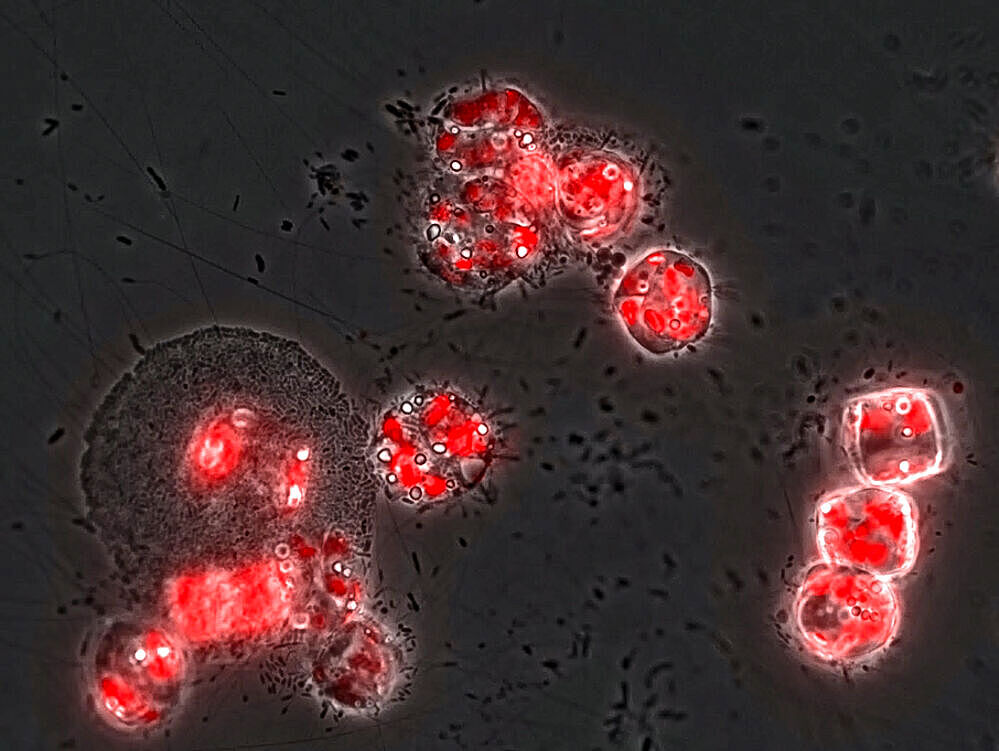Algae’s photosynthesis helps to store considerable amounts of carbon in the oceans - about the same amount as plants manage to store on land. A large proportion of this marine photosynthesis takes place during massive phytoplankton blooms, in which microalgae produce biomass on a large scale, including a wide variety of carbohydrates. This biomass can be decomposed by marine bacteria and provides an important source of energy for the entire marine food web.
For several years, the researchers involved in the study have been investigating the dynamics of microbial communities during microalgal blooms in a long-term study in the North Sea, off the island of Heligoland. As part of the study, they want to find out how bacteria interact with algae and are able to process the particularly complex marine carbohydrate compounds. The goal is to improve our understanding of important mechanisms of the "biological pump function" of the oceans during the age of global warming.
The dynamic processes of carbohydrate synthesis and decomposition were the subject of the current study. One of the most important discoveries is that algal carbohydrates, in particular their main polysaccharide laminarin, are not only used directly by bacteria as an energy source, they are also converted into the bacteria's own carbohydrates (alpha-glucans). These can then provide nutrients for other bacteria and thus foster bacterial growth and regeneration during phytoplankton blooms in the oceans.
Analysis of the proteins and enzymes involved has enabled the researchers to identify one of nature’s widespread metabolic mechanisms that enables efficient recycling of the bacterial storage polysaccharide alpha-glucan from dead bacterial biomass, otherwise known as necromass, within marine microbial communities.
"Our research highlights a previously unidentified mechanism for storing energy within microbial populations and emphasises the importance of bacterial necromass recycling for maintaining carbon fluxes in marine ecosystems. In nature, it's always about energy. Just like human glycogen or plant starch on land, bacterial alpha-glucans play an important role as glucose-containing energy reservoirs in the oceans," explains Prof. Dr. Thomas Schweder from the Institute of Pharmacy at the University of Greifswald and corresponding author of the study.
The study decodes central metabolic pathways and enzyme functions of alpha-glucan utilisation in marine bacteria and thereby finds analogies to similar metabolic pathways in closely related intestinal bacteria in humans. The data shows how extracted alpha-glucans from the own bacterial population specifically activate these bacterial decomposition pathways and indicates a preferred recycling of these energy storage substances by the bacteria. The study thus provides a deeper understanding of one of the most energetically important microbial carbohydrate metabolism processes in the sea.
"In our study, we have been able to show for the very first time how marine bacteria utilise alpha-glucans from dead related bacteria despite a coinciding oversupply of the algal storage polymer laminarin. So, what we are seeing is a kind of cannibalism within the bacterial community. This targeted recycling of bacterial storage polysaccharides presumably represents a central mechanism for conserving energy within the population, which keeps significant amounts of glucose-bound carbon in the microbial carbon cycle of the oceans," explains the lead author of the study, Dr. Irena Beidler from the Institute of Pharmacy at the University of Greifswald.
The research results provide valuable insights into the dynamics and adaptability of the metabolism of bacterial communities in the sea and thus an important piece of the puzzle for improving our understanding of global nutrient cycles and carbon storage within marine ecosystems.
Further information
Study
Irena Beidler, Nicola Steinke, Tim Schulze, Chandni Sidhu, Daniel Bartosik, Marie-Katherin Zühlke, Laura Torres Martin, Joris Krull, Theresa Dutschei, Borja Ferrero-Bordera, Julia Rielicke, Vaikhari Kale, Thomas Sura, Anke Trautwein-Schult, Inga V. Kirstein, Karen H. Wiltshire, Hanno Teeling, Dörte Becher, Mia Maria Bengtsson, Jan-Hendrik Hehemann, Uwe T. Bornscheuer, Rudolf I. Amann, Thomas Schweder (2024): Alpha-glucans from bacterial necromass indicate an intra-population loop within the marine carbon cycle in: Nature Communications. DOI: 10.1038/s41467-024-48301-5
DFG Research Group 2406 "Proteogenomics of Marine Polysaccharide Utilization" (FOR 2406 POMPU)
Participating working groups at the University of Greifswald:
Prof. Dr. Thomas Schweder
Prof. Dr. Uwe Bornscheuer
Prof. Dr. Dörte Becher
Dr. Mia Bengtsson
Further participating working groups:
Prof. Dr. Jan-Hendrik Hehemann
Prof. Dr. Rudi Amann
Prof. Dr. Karen H. Wiltshire
Contact at the University of Greifswald
Prof. Dr. Thomas Schweder
Pharmaceutical Biotechnology
Institute of Pharmacy
Felix-Hausdorff-Straße 3, 17489 Greifswald
Tel.: +49 3834 420 4212
schwederuni-greifswaldde

